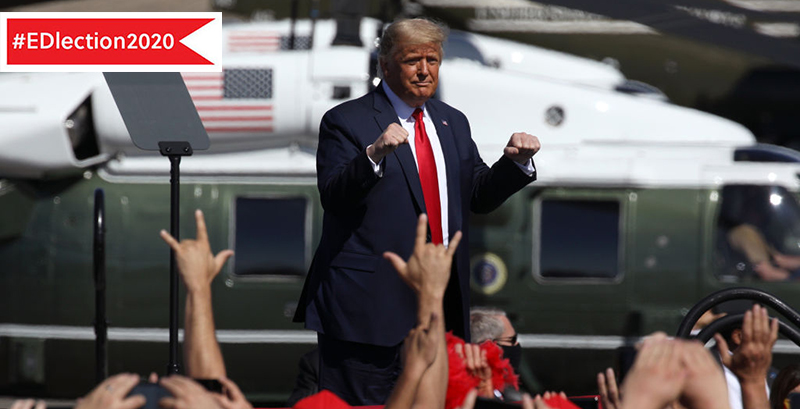Stepman: The Education Case for Trump — He’s Shined a Spotlight on What Students Are Learning & Empowered Families Through School Choice

Since President Ronald Reagan took office a year after its creation, the U.S. Department of Education has been a focus of hostility from Republicans and conservatives. There’s good reason for skepticism; while spending on education has almost tripled in the past 50 years, test scores – as well sociological and racial gaps between students – have remained flat or even gotten worse.
But seeing as the department still stands, and Secretary Betsy DeVos’s proposed budgetary belt-tightening was rejected by Congress, what have four years of President Donald Trump brought the country in terms of education? The Trump administration has refocused away from attempting to zero out endlessly increasing federal programs with little positive evidence to show for their effort, and toward empowering and protecting students and families.
Most notably, the administration has reversed two devastating Obama-era policies (promulgated by Dear Colleague letters rather than through the rulemaking process) regarding discipline in K-12 public schools and Title IX in colleges and universities, the latter of which Vice President Joe Biden has vowed to bring back if elected president.
Under the previous administration, Department of Education investigations persuaded many K-12 districts to adopt lax discipline policies that allowed students who committed dangerous or violent acts to fly under the radar for years, sometimes with tragic consequences. While the push for “restorative justice” was a well-intended attempt to close racial gaps in suspensions and referrals to law enforcement, in reality, it left teachers and principals with fewer tools to combat very real rising violence in schools.
Instead of investigating elementary and secondary schools for decisions that are inherently better understood at the classroom level, like suspensions, the Trump administration’s Office of Civil Rights has turned its eye toward universities.
Prior to Trump’s election, the department’s reinterpretation of Title IX encouraged the proliferation of flagrant due process violations in sexual misconduct cases on campus, resulting in hundreds of wronged students suing in federal court and winning settlements.
Under DeVos, the department has engaged in actual rulemaking (rather than the end-runs around the Administrative Procedure Act that Dear Colleague letters represent) to protect college students’ due process rights. When a student is accused of a Title IX violation, schools may no longer use the unfair “single investigator” model, nor can they deny the accused the right to counsel and cross-examination through third parties.
The department has also called woke university presidents’ bluffs and launched civil rights investigations in cases when a college’s own administration has declared its campus a racially hostile environment.
Trump’s greatest contribution to education in the past four years, however, has been to shine his megawatt spotlight on the critical issue of what young Americans are learning, and advancing school choice as a solution for frustrated families. Nearly every poll shows a growing generational divide with regard to how we feel about our own country, between baby boomers and Gen X on the one hand, and millennials and Gen Z on the other. Nearly 40 percent believe this country is “among the most unequal societies in the world,” a view that is ludicrous to the millions of people all over the world who still dream of coming to the Land of the Free.
These views about the fundamental injustice about the American project coincide with all-time lows in actual civic knowledge. Only one in five Americans under 45 can pass the citizenship test for naturalizing immigrants, which includes such grade-school basics as the number of years in a U.S. senator’s term and the names of the three branches of the federal government.
And little wonder, when even in a politically moderate state like Ohio, the Department of Education provides “resources” for social studies teachers that include an article arguing that the “stone idol” of whiteness “must be smashed to pieces.” Other articles recommended have titles like “White People Have No Culture” and “In Defense of Looting.”
The collective American project has always been to advance, however imperfectly, toward a more perfect union founded on the creed that is the cornerstone of our Republic. That project necessarily requires citizens to learn about, and hopefully from, America’s great errors and mistakes.
But in recent decades, the education system from kindergarten on up, and especially our universities, sees as its project not to merely inform students about the United States’s full and unvarnished history, but to divorce young Americans from their country and strip them of a connection to its heroes. A nation that spends $700 billion annually on K-12 and trillions on federally backed student loans for universities to alienate its future generations from itself cannot survive.
Trump’s rhetoric about “patriotic education” and warnings about the education system as a vehicle for left-wing narratives like the discredited 1619 Project get him some of his biggest cheers on the campaign stump. It’s that focus which will be the president’s greatest legacy on education, and one that, had it been taken up by establishment Republicans a decade ago, would have made Trump’s ascension to the presidency, with all it represents, unnecessary.
Inez Feltscher Stepman is a senior policy analyst focusing on education at Independent Women’s Forum, and a Lincoln Fellow with the Claremont Institute.
Get stories like these delivered straight to your inbox. Sign up for The 74 Newsletter

;)